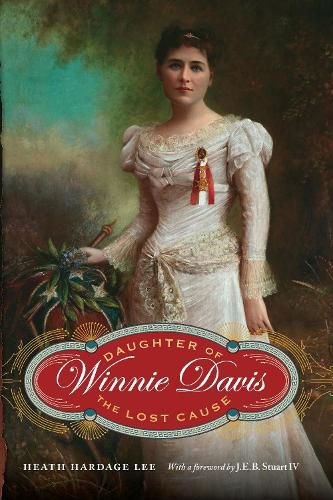Readings Newsletter
Become a Readings Member to make your shopping experience even easier.
Sign in or sign up for free!
You’re not far away from qualifying for FREE standard shipping within Australia
You’ve qualified for FREE standard shipping within Australia
The cart is loading…






Varina Anne Winnie Davis was born into a war-torn South in June of 1864, the youngest daughter of Confederate president Jefferson Davis and his second wife, Varina Howell Davis. Occurring only a month after the death of beloved Confederate hero general J.E.B. Stuart during a string of Confederate victories, Winnie’s birth was hailed as an omen of victory by war-weary Southerners. But after the Confederacy’s ultimate defeat, Winnie would spend her early life as a genteel refugee and expatriate abroad. After returning to the South from German boarding school, Winnie was christened the Daughter of the Confederacy in 1886. For Confederate veterans and the United Daughters of the Confederacy, Winnie became an icon of the Lost Cause, eclipsing even her father. Winnie Davis: Daughter of the Lost Cause is the first published biography of this little-known woman who unwittingly became the female symbol of the defeated South. Winnie’s controversial engagement in 1890 to a Northerner lawyer whose grandfather was a famous abolitionist and her later move to work as a writer in New York City shocked her friends, family, and the Southern groups who worshiped her. Faced with the pressures of a community that violently rejected the match, Winnie desperately attempted to reconcile her prominent Old South history with her personal desire for tolerance. AUTHOR: Heath Hardage Lee has a background in museum education and historic preservation. She holds a BA in history with honors from Davidson College and an MA in French language and literature from the University of Virginia. Lee started her museum career at the Levine Museum of the New South in Charlotte, North Carolina, and later worked for southern house museums Stratford Hall and Menokin Plantation. She has written on southern history for magazines, newspapers, and blogs, such as America’s Civil War, Richmond Times-Dispatch, [Fredericksburg] Free Lance-Star, and Work Stew. Lee recently served as the coordinator of the history series for Salisbury House and Gardens in Des Moines, Iowa, and currently works as the editorial assistant for Virginia Magazine of History and Biography.
$9.00 standard shipping within Australia
FREE standard shipping within Australia for orders over $100.00
Express & International shipping calculated at checkout
Varina Anne Winnie Davis was born into a war-torn South in June of 1864, the youngest daughter of Confederate president Jefferson Davis and his second wife, Varina Howell Davis. Occurring only a month after the death of beloved Confederate hero general J.E.B. Stuart during a string of Confederate victories, Winnie’s birth was hailed as an omen of victory by war-weary Southerners. But after the Confederacy’s ultimate defeat, Winnie would spend her early life as a genteel refugee and expatriate abroad. After returning to the South from German boarding school, Winnie was christened the Daughter of the Confederacy in 1886. For Confederate veterans and the United Daughters of the Confederacy, Winnie became an icon of the Lost Cause, eclipsing even her father. Winnie Davis: Daughter of the Lost Cause is the first published biography of this little-known woman who unwittingly became the female symbol of the defeated South. Winnie’s controversial engagement in 1890 to a Northerner lawyer whose grandfather was a famous abolitionist and her later move to work as a writer in New York City shocked her friends, family, and the Southern groups who worshiped her. Faced with the pressures of a community that violently rejected the match, Winnie desperately attempted to reconcile her prominent Old South history with her personal desire for tolerance. AUTHOR: Heath Hardage Lee has a background in museum education and historic preservation. She holds a BA in history with honors from Davidson College and an MA in French language and literature from the University of Virginia. Lee started her museum career at the Levine Museum of the New South in Charlotte, North Carolina, and later worked for southern house museums Stratford Hall and Menokin Plantation. She has written on southern history for magazines, newspapers, and blogs, such as America’s Civil War, Richmond Times-Dispatch, [Fredericksburg] Free Lance-Star, and Work Stew. Lee recently served as the coordinator of the history series for Salisbury House and Gardens in Des Moines, Iowa, and currently works as the editorial assistant for Virginia Magazine of History and Biography.